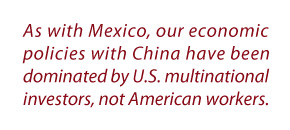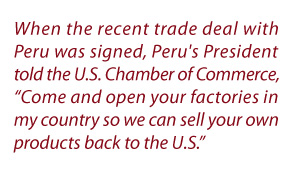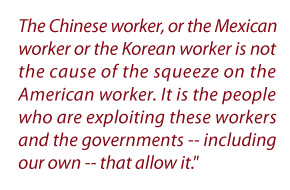“Globalization is dramatically disconnecting the relationship between American corporate employers and their employees,” says Jeff Faux, EPI founding president and distinguished fellow. Faux has written extensively about the ways so-called free trade agreements have benefitted the world’s largest corporations at the expense of the average worker, and shown how the winners and losers of trade agreements line up not along national borders, but according to their economic status. In 2006 Faux published the book The Global Class War, and co-authored EPI’s paper, Revisiting NAFTA, where he argued that 1993’s North American Free Trade Agreement (NAFTA) had served to “protect the interests of large corporate investors, while undercutting workers’ rights.” With growing concern over China’s trade policy again putting world trade and globalization in the spotlight, Faux spoke about U.S. trade around the world and outlined how many U.S. trade policies had undermined the American economy.
Q. A recent EPI report shows that China’s trade policy — and its currency manipulation in particular — has cost millions of American jobs. However in The Global Class War and other publications, you are critical of U.S. trade policy as well. How has our domestic trade policy also been a factor in the loss of jobs and the depression of wages in the United States?
Faux: In 2000 the United States government opened up the U.S. market to China by granting it what used to be called “Most Favored Nation” trade status, on a permanent basis. In exchange, the Chinese loosened restrictions on U.S. investment in China. It was one of a series of so-called “free trade” agreements negotiated by both Republicans and Democrats over the last 30 years that effectively gave other countries a free pass to flood American markets with low-priced goods and services produced under conditions we would not tolerate here. The results lost jobs, lower wages, chronic trade deficits, and a huge and growing foreign debt—should have been no surprise.
Q. Certainly you and others had warned of China’s oppression of worker rights and its power “to manipulate its currency in order to increase its trade balance.” Why didn’t more American policy makers see or take these warnings seriously?
Faux: Some of them actually believed in — or were intellectually intimidated by — the “free-market” fundamentalism that has dominated American politics since  the Ronald Reagan era. Many considered themselves sympathetic to workers and believed free trade would enable both the United States and China to concentrate on their “comparative advantage.” They conceded, in private at least, that jobs in apparel, shoes, and similar American industries would leave. But they insisted more trade with China would produce many more high-paying jobs here in America in advanced sectors, such as electronics, computers, and silicon chips.
the Ronald Reagan era. Many considered themselves sympathetic to workers and believed free trade would enable both the United States and China to concentrate on their “comparative advantage.” They conceded, in private at least, that jobs in apparel, shoes, and similar American industries would leave. But they insisted more trade with China would produce many more high-paying jobs here in America in advanced sectors, such as electronics, computers, and silicon chips.
Among many things they did not understand was that in today’s global economy, government industrial policies can dramatically change a nation’s comparative advantages. American political leaders at the time lectured us that in a global economy, “the era of big government is over.” Meanwhile the Chinese government was subsidizing new sectors, protecting their industries from foreign competition, and demanding that U.S. companies doing business there share their technology. Now, contrary to what the free-traders confidently predicted, we are running a chronic trade deficit with China in high-tech products. Most American workers are not climbing up the global job ladder, they are falling behind.
Q. So it was a case of naïve economic analysis?
Faux: For some. But I think for most politicians economic theory conveniently rationalized their support of the interests of corporate CEOs over their workers. Remember, over the last 30 years, the share of campaign contributions representing big business has grown dramatically — as has the number of ex-administration officials and members of Congress who go to work for corporations as employees, consultants, and lobbyists.
Q. Why would American business corporations support policies that would undercut the American economy?
Faux: Because globalization is dramatically disconnecting the relationship between American corporate employers and their employees. There has always been conflict over the shares of the benefits of worker productivity going to profits and wages. But until recently, you could assume that both workers and businesses had a common interest in producing in America. As companies became multinational, whether they actually produced in America was irrelevant to their investors and top managers. The boss might be an American by birth and culture, but he or she no longer identified the future of the company with the future of America. They were paid to invest where the cost of labor and environmental regulation was cheapest.
Corporate leaders have not been shy about admitting this. In 1995, the head of Ford Motor Co. observed that “Ford is not an American company.” A decade later, the CEO of Cisco Systems — a poster-child company for U.S. technology — explained the company’s corporate strategy this way: “What we are trying to do is outline an entire strategy of becoming a Chinese company.”
This reality has not yet seeped into our political consciousness. When the CEOs of these multinationals or their lobbyists walk into the White House or the office of a member of Congress or hold a press conference to rail against “protectionism,” the media often assumes that they are representing American interests. Those days are over.
Q. Explain what you meant when you said “so-called” free trade agreements?
 Faux: Their major purpose is not to promote trade by making it easier for each country to export what it does best. Rather, these agreements provide global corporations with the opportunity to outsource production for the U.S. market. When the recent trade deal with Peru was signed, that country’s president told the U.S. Chamber of Commerce, “Come and open your factories in my country so we can sell your own products back to the U.S.” This is not what Adam Smith, David Ricardo, and the classical advocates of free trade had in mind.
Faux: Their major purpose is not to promote trade by making it easier for each country to export what it does best. Rather, these agreements provide global corporations with the opportunity to outsource production for the U.S. market. When the recent trade deal with Peru was signed, that country’s president told the U.S. Chamber of Commerce, “Come and open your factories in my country so we can sell your own products back to the U.S.” This is not what Adam Smith, David Ricardo, and the classical advocates of free trade had in mind.
We are no longer just talking about simple trade among economies defined by national frontiers. Today’s globalization represents the creation of a world market without the enforceable rules that make markets work for everyone’s benefit. Led by multinational corporate interests, American policy makers pushed American workers into a brutally competitive market that resembles not so much the future, but the past: the 19th century dog-eat-dog robber baron era.
Q. In your book, The Global Class War, you write that it is important to remember that there are rich people in poor countries and poor people in rich countries. Explain.
Faux: The disconnect between r
ich and poor — between investors and workers — is happening all over the world. Increasingly, this means that the owners and managers of global corporations have more in common with each other than with workers who happen to share their nationality. The experience of the North American Free Trade Agreement since its implementation in 1994 illustrates the point. Every so often a poll is taken in all three countries — the United States, Mexico, and Canada. They ask the respective publics which countries they think “won” economically from NAFTA and which “lost.” Typically, the people of each country say workers in the other two nations gained and workers in their country lost.
But if you look at the numbers you find the same pattern in each country — a growing gap between labor productivity and real wages. Workers are working more efficiently, but getting a smaller share of the benefits. In other words, the bargaining position of working people in each of the countries declined. One reason is that free trade permitted employers in Canada and the United States to move production to lower-wage Mexico, or to threaten them with moving to Mexico if they do not agree to lower wages and other concessions.
Q. But the gap between labor productivity and wages is widening in Mexico, too.
Faux: Yes. Because the U.S. and Canadian leaders who negotiated NAFTA refused to include labor and environmental protections in the treaty. The Mexican government is notorious for encouraging employers to suppress wages and deny the right to organize. But protections were not left out of the agreement because the Mexicans didn’t want them. They were left out because U.S. and Canadian businesses didn’t want these protections.
Again, the outcome was perfectly predictable. American and Canadian workers are losing jobs and income, and Mexican workers can’t make enough to support their families. But the top managers and owners of U.S. and Canadian companies are gaining profits because they can now get cheaper labor. And the top managers and owners of Mexican companies are getting the outsourcing contracts. As the Mexican analyst Jorge Castanada — who later became that country’s foreign minister — wrote at the time, NAFTA was “an agreement for the rich and powerful in the United States, Mexico, and Canada, an agreement effectively excluding ordinary people in all three societies.”
Q. Is a similar trend playing out now in U.S.-China trade? How is the Chinese situation different?
Faux: As with Mexico, our economic policies with China have been dominated by U.S. multinational investors, not American workers. China’s policy of keeping  the value of its currency low has been the mirror image of Wall Street’s — and therefore the U.S. Treasury’s — desire to keep the dollar “strong.” Given the trade deficit, this seems totally irrational; it makes U.S. produced goods expensive and Chinese goods cheap. But if you are an American corporation or bank looking to invest in China, an expensive dollar has made it cheaper for you.
the value of its currency low has been the mirror image of Wall Street’s — and therefore the U.S. Treasury’s — desire to keep the dollar “strong.” Given the trade deficit, this seems totally irrational; it makes U.S. produced goods expensive and Chinese goods cheap. But if you are an American corporation or bank looking to invest in China, an expensive dollar has made it cheaper for you.
Given today’s high unemployment rates, the U.S. trade deficit with China is getting to be a national scandal, and politicians are running scared. Even so, the Obama administration thus far, like the Bush administration before it, cannot bring itself to declare what everyone knows to be true — that China manipulates its currency to support its trade surplus.
Unlike the Mexican governing class, the Chinese government has a clear strategy for economic development that uses every policy tool it can — whether they are fair or unfair, legal under the rules of the World Trade Organization or not. Our government should be equally committed to a re-development strategy to substantially cut, if not eliminate, our trade deficit, starting with a new exchange rate deal with China. Holding more than $2 trillion in our IOUs gives them a bargaining chip. But we have even more leverage in the threat to close off the U.S. market that they still depend on. So it’s time to send a message that the free ride is over — to both the Chinese leaders and their American corporate partners.
Q. Is there better way to align U.S corporate and national interests?
Faux: Until we deal with the issue of money in politics, the inordinate influence of the rich and powerful in Washington will continue. So we need to make the general public aware of the damage that trade deficit is doing now and will be doing to living standards. And cleaning up our political language is an important first step. Americans are not just competing with the Chinese. They are competing with an alliance between Chinese communists who supply the cheap labor and American and other first world capitalists who have supplied the capital and technology. Nor is it just China’s “fault.” Chinese leaders are doing what is best for China. The central problem is getting American leaders to do the same for America.
Moreover, in a global economy, working people need to understand their common interest across borders. The Chinese worker, or the Mexican worker, or the Korean worker is not the cause of the squeeze on the American worker. It is the people who are exploiting those workers, and the governments — including our own — that allow it.
Q. But isn’t globalization and increased economic integration among different nations often an inevitable result of modern transportation, technology, and information? And if so, what can we really do about it?
Faux: First, we should stop making things worse. The rule when you find yourself in a hole is to stop digging. Today, the Obama administration is still promoting more of the same trade agreements that have consistently failed in the past. We are told that free trade agreements with countries like Colombia and Korea will increase exports. That’s probably true. But as we have learned over the last 30 years, they will increase imports more. The net result will be to destroy U.S. jobs and add to our global debts.
Second, we need to show China that we will do whatever it takes to reduce our trade deficit with them. Getting them to stop keeping their currency artificially low is the first step. Demanding that they adhere to international labor standards is just as important. No one expects that Chinese workers will get the same pay as Americans. But we can and should prohibit goods coming into this country from China and elsewhere that are made under inhumane working conditions.
Third, we need to get serious about our own lack of competitiveness. This means making a huge investment in infrastructure, education, and technology aimed specifically at increasing the market both here and abroad for American-made goods and services—especially in the cutting edge technologies of the future. The current administration seems to understand the need, but has been far too timid. Everyone gives lip service to the need to give Americans first class education and training. It is pointed out that countries like Denmark enjoy both high wages and are internationally competitive. But the Danes invest 4% of their GDP on human resource development—a number that would be laughed out of the room in today’s Washington.
Fourth, the United States needs to take the lead in creating rules for the global economy that assure that wages and environmental standards are raised along with economic growth. A first step would be to fulfill the pledges to renegotiate NAFTA to provide for worker and environmental protections that were made by both President Obama and Secretary of State Clinton in their primary campaigns. The next step should be to make violation of labor rights a punishable violation of the rules of the World Tra
de Organization.
Q. Your book and many of your publications were written before the current Great Recession. What additional lessons about world trade have come out of this severe economic downturn?
Faux: The crash of 2008 and its aftermath was a wake-up call. But we are still on the snooze button. The bubble economy of the previous decades hid the grim reality that the United States was not paying its way in the world. If Americans could borrow and spend to maintain their living standards, Washington policy makers could happily ignore the fact that each year we were buying more from the rest of the world than we were selling and falling deeper into debt.
That era is over. The president has rightly said, “We cannot rebuild this economy on the same pile of sand. We must move us from an era of borrow and spend to one where we save and invest; where we consume less at home and send more exports abroad.”
The choices are clear. We can rebalance our trade with serious investment and trade strategies that expand the market for U.S.-produced goods. Or we can wait for the global market to force us to compete in the world by lowering our wages and living standards.
And time is running out.
